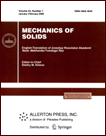 | | Mechanics of Solids
A Journal of Russian Academy of Sciences | | Founded
in January 1966
Issued 6 times a year
Print ISSN 0025-6544
Online ISSN 1934-7936 |
Archive of Issues
| Total articles in the database: | | 13427 |
| In Russian (Èçâ. ÐÀÍ. ÌÒÒ): | | 8178
|
| In English (Mech. Solids): | | 5249 |
|
| << Previous article | Volume 51, Issue 5 / 2016 | Next article >> |
| V.I. Karev, D.M. Klimov, Yu.F. Kovalenko, and K.B. Ustinov, "Fracture of Sedimentary Rocks under a Complex Triaxial Stress State," Mech. Solids. 51 (5), 522-526 (2016) |
| Year |
2016 |
Volume |
51 |
Number |
5 |
Pages |
522-526 |
| DOI |
10.3103/S0025654416050022 |
| Title |
Fracture of Sedimentary Rocks under a Complex Triaxial Stress State |
| Author(s) |
V.I. Karev (Ishlinsky Institute for Problems in Mechanics, Russian Academy of Sciences, pr. Vernadskogo 101, str. 1, Moscow, 119526 Russia, wikarev@ipmnet.ru)
D.M. Klimov (Ishlinsky Institute for Problems in Mechanics, Russian Academy of Sciences, pr. Vernadskogo 101, str. 1, Moscow, 119526 Russia, klimov@ipmnet.ru)
Yu.F. Kovalenko (Ishlinsky Institute for Problems in Mechanics, Russian Academy of Sciences, pr. Vernadskogo 101, str. 1, Moscow, 119526 Russia, perfolinkgeo@yandex.ru)
K.B. Ustinov (Ishlinsky Institute for Problems in Mechanics, Russian Academy of Sciences, pr. Vernadskogo 101, str. 1, Moscow, 119526 Russia, ustinov@ipmnet.ru) |
| Abstract |
Most sedimentary rocks have layered structure, and their strength properties are therefore anisotropic; as a consequence, the rock strength depends on the direction of the applied stresses. In this case, various fracture mechanisms are possible. The following two possible fracture mechanisms are considered: actions along the bedding planes, which are weakening surfaces, and along the planes where stresses exceeding the total rock strength are attained. A triaxial independent loading test bench was used to study the fracture conditions for layered rocks composed of productive oil-and-gas strata in complex true triaxial loading tests. The study shows a good qualitative agreement between experimental results and theoretical estimates. |
| Keywords |
rock, anisotropic strength, true triaxial loading test |
| References |
| 1. | A. I. Spivak and A. N. Popov,
Rock Fracture in Well Drilling
(Nedra, Moscow, 1994)
[in Russian]. |
| 2. | K. M. Tagirov and V. I. Nifontov,
Well Drilling and Oil-and-Gas Formation Exposing in Depression
(Nedra, Moscow, 2003)
[in Russian]. |
| 3. | Yu. A. Kashnikov, S. G. Ashikhman, D. V. Shustov, and S. E. Chernyshov,
"Estimation of the Well Wall Stability without Reliable Information about the Geomechanical Characteristics of Rocks,"
Neft. Khoz.,
No. 1, 41-43 (2015). |
| 4. | V. I. Karev and Yu. F. Kovalenko,
"Triaxial Loading System as a Tool for Solving Geotechnical Problems
of Oil and Gas Production,"
in True Triaxial Testing of Rocks. Ser. Geomechanics Research Series
(CRC Press/Balkema, Leiden, 2013),
pp. 301-310. |
| 5. | D. M. Klimov, V. I. Karev, Yu. F. Kovalenko, and K. B. Ustinov,
"Mechanical-Mathematical and Experimental Modeling of Well Stability in Anisotropic Media,"
Izv. Akad. Nauk. Mekh. Tverd. Tela,
No. 4, 4-12 (2013)
[Mech. Solids (Engl. Transl.)
48 (4), 357-363 (2013)]. |
| 6. | D. M. Klimov, V. I. Karev, Yu. F. Kovalenko, and K. B. Ustinov,
"Mathematical and Physical Modeling of Rock Fracture in Slanted Well Drilling,"
Tekhnolog. TEK, No. 5, 22-27 (2006). |
| 7. | M. Singh, N. K. Samadhiya, A. Kumar, et al.,
"A Nonlinear Criterion for Triaxial Strength of Inherently Anisotropic Rocks,"
Rock Mech. Rock. Engng
48 (4), 1387-1405 (2015). |
| 8. | K. Mogi,
"Fracture and Flow of Rocks under High Triaxial Compression,"
J. Geophys. Res.,
No. 76, 1255-1269 (1971). |
| 9. | E. Hoek and E. T. Brown,
"Practical Estimates of Rock Mass Strength,"
Int. J. Rock Mech. Min. Sci.
34 (8), 1165-1186 (1997). |
| 10. | N. Barton,
"The Shear Strength of Rock and Rock Joints,"
Int. J. Rock Mech. Min. Sci. Geomech. Abstr.
13 (9), 255-279 (1976). |
| 11. | R. E. Goodman,
Introduction to Rocks Mechanics
(Wiley, New York, 1980). |
| 12. | N. Barton,
A Model Study of Behavior of Steep Excavated Rock Slopes,
PhD Thesis
(Univ. London, 1971). |
| 13. | N. Barton,
"From Empiricism, through Theory, to Problem Solving in Rock Mechanics.
Harmonizing Rock Engineering and the Environment,"
in Proceedings of the 12th ISRM International Congress on Rock Mechanics
Ed. by Qihi Qian and Yingxin Zhou
(Beijing, China, 2011),
pp. 3-17. |
| 14. | L. M. Kachanov,
Foundations of the Theory of Plasticity
(North-Holland, Amsterdam-London, 1971). |
| 15. | C. A. Coulomb,
"Essai sur une application des règles des maximiset minimis à quelques problèms de statique relatifs, à l'architecture,"
Mem. Acad. Roy.
7, 343-387 (1776). |
| 16. | D. C. Drucker and W. Prager,
"Soil Mechanics and Plastic Analysis for Limit Design,"
Quart. Appl. Math.
10 (2), 157-165 (1952). |
|
| Received |
26 May 2016 |
| Link to Fulltext |
|
| << Previous article | Volume 51, Issue 5 / 2016 | Next article >> |
|
 If you find a misprint on a webpage, please help us correct it promptly - just highlight and press Ctrl+Enter If you find a misprint on a webpage, please help us correct it promptly - just highlight and press Ctrl+Enter
|
|

 Russian
Russian  English
English